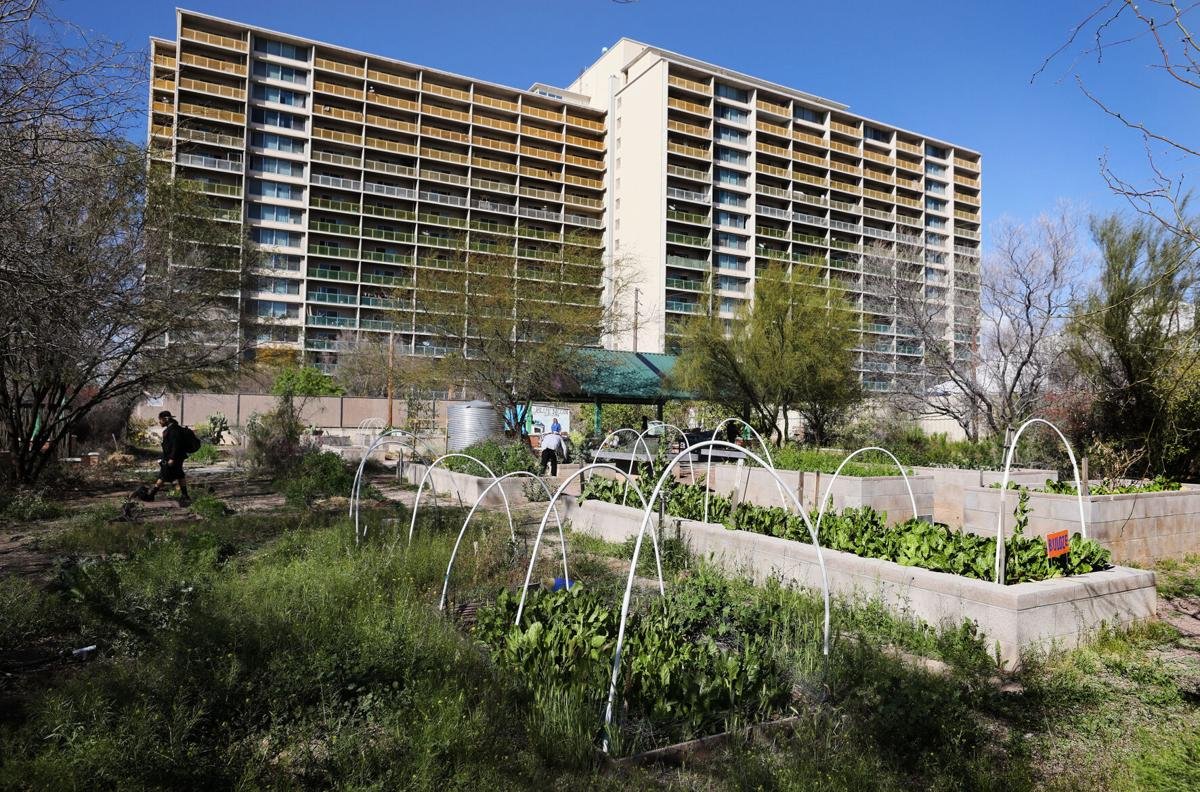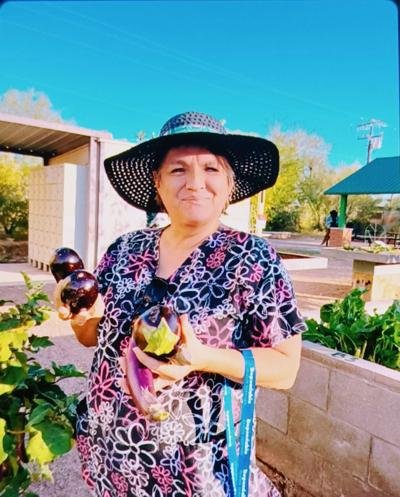Article by: Caitlin Schmidt, Arizona Daily Star
Photo Credit: Mamta Popat, Arizona Daily Star
When Charli came to live at Tucson House, the city's largest public housing community, she brought along plenty of trauma she needed to unpack.
A domestic violence and cancer survivor, she had been living in her car before a city outreach program for homeless Tucsonans found her in April 2020 and got her off the street.
Charli began her journey toward healing, leaning into her faith. And, in November, she found an additional, unexpected source of comfort. She bought a plot at Blue Moon Community Garden, tucked away at 1501 N. Oracle Road in the neighborhood behind Tucson House.
She made friends with other gardeners who taught her the craft. They shared food and attended events at the garden. In a short time, Charli, who is at high risk for COVID and used to prefer spending most of her time alone, came to enjoy being part of a community, which she says is thanks to the garden.
"Just being able to be out there and spent time with the dirt and the fresh air and sunshine and events has been amazing," she said.
People involved in community gardens see improvements in several areas of health, including increased emotional well-being, studies have found. They increase their physical activity and enjoy the benefits of eating more fruits and vegetables, says a report in the Journal of Community Practice.
Community gardens have proven to be "a way to successfully bring together people of different races and other people who would not normally socialize," the report adds.
Blue Moon Community Garden is one of 17 gardens throughout the city overseen by the nonprofit Community Gardens of Tucson. Through regular events for gardeners and neighbors, the group aims to bring people together to grow not only healthy foods, but also relationships.
Fees based on ability to pay
Community Gardens of Tucson got its start in 1990 as a University of Arizona program to teach gardening through hands-on experience. In 1995 it shifted into an independent organization. The first garden was created on a donated vacant lot near First Avenue and Limberlost Road. Plots were rented for the cost of water.
By 1997, CGT had six gardens under its umbrella, each with its own site coordinator and connections to its neighborhood. The group registered as a nonprofit in 2009 and now, more than 30 years after its creation, its 17 gardens are cared for by more than 300 gardeners.
CGT supports itself through plot fees, which are based on a person's ability to pay, and through donations.
In exchange for a modest rental fee — $22 per month at Blue Moon, for example — gardeners receive a designated plot, irrigation, and access to tools, compost, mulch and seeds. There's a sliding scale for people who need financial assistance. Each garden has a site coordinator who helps maintain the public spaces and educate gardeners and visitors.
Blue Moon Community Garden opened in March 2012. Nearly a decade later, in February 2022, the city partnered with CGT to enhance the safety and improve the infrastructure at the garden, in order to promote community health and increase access to fresh produce.
With input from Tucson House residents, organizers identified their priorities: To increase access to healthy food, social events, and nutrition and cooking resources. The project included simple enhancements to the garden, including new fencing, lighting and repairs; increased signage between the garden, Tucson House and the neighborhood; and a permanent composting toilet.
The improvements were completed in August, and a well-attended neighborhood celebration was held on site the next month.
CGT Board President Gillian Paine-Murrieta said all the gardens have seen an uptick in participation since the pandemic, both in individual gardeners and in groups.
The UA's Compost Cats assist in composting and local roaster Decibel Coffee Works donates coffee grounds for gardeners to use for mulch. UA Greek Life members regularly volunteer at the gardens' weekly work days, and recently, a local Eagle Scout installed insect hotels, raised garden beds for people with mobility devices, and installed a message board at Blue Moon.
Many of the gardens are at 100% capacity, and the lowest occupancy is 65%, Paine-Murrieta said.
"Each garden has its own unique feel and flavor to it, and as the gardener population changes, that feel and flavor can also change," Paine-Murrieta said. "We need to highlight that there's a sense of community, but it can be a slightly different flavor of community."
Blue Moon gardeners, for instance, grow Hopi cotton and prickly pear cactus for their edible nopales, in addition to the typical fruits and vegetables.
CGT collaborates with the International Rescue Committee to provide plots for refugees or asylum seekers to grow food for their families and to sell residual crops to supplement their incomes.
On a recent Tuesday afternoon at Blue Moon, a handful of gardeners were on site, weeding and tending to their plots. Lettuce, kale and broccoli were abundant and a tobacco plant towered out of one of the community plots.
In addition to the individual and community plots, Blue Moon also has a walking path lined with pollinator plants, a water harvesting unit, a composting toilet, an owl box and a large gazebo for community gatherings.
"I think there's so much good that we are doing and so much better things that we can do through education classes and things like that," Paine-Murrieta said.
Educational opportunities have included yoga, natural dye classes, ecological therapy, vermiculture — worm composting — and more.
"We want to create a connection and a community," Paine-Murrieta said. "We're welcoming to all different groups of people and expertise and to create community, we need diversity of voices."
Parties and get-togethers
Blue Moon site coordinator Angel Coronado has been involved with gardening projects across Tucson for years, but said he became deeply involved with Blue Moon during the pandemic lockdown of 2020.
"It was the only place we had to ourselves that was wide open and kept me from the monotony of being in my own house," he said.
Coronado, who loves to grow the hottest peppers he can find, said the garden has increased in popularity over the years. There are only three plots left and a wait list is on the horizon.
"We've had a lot more parties and get togethers," Coronado said. "Poetry, yoga, book signings, everything. We're trying to bring something for everybody."
The garden has also become an escape for neighborhood kids, as youth visitors avoid a nearby park where drug use has increased, and come instead to Blue Moon Garden, Coronado said.
The Journal of Community Practice report found that youth gardening projects have an overall positive effect and were found to produce positive dietary, academic and developmental results.
Community gardens have also been shown to help combat food insecurity. Feeding America estimates that 34 million people in the United States are food insecure, including 9 million children.
In Arizona, one in nine people face hunger, and for children in the state, that number climbs to one in six, according to Feeding America.
As many people struggle to access fresh fruits and vegetables and continue to face food insecurity, community gardens have helped reduce nutritional gaps, says an article published by Columbia's Mailman School of Public Health.
Coronado, who started working as the Blue Moon site coordinator earlier this year, thanks to a grant from the Community Food Bank of Southern Arizona, said he's loved seeing the relationships that have formed.
"After the first party, a group of four people would start going every day. Then it was six, then eight, then 12," he said. "The more people who are involved, the better."
Transformative
Charli said that she used to enjoy gardening when she was little, though the only gene she didn't inherit from her mother was a green thumb.
"But some of my neighbors and now my garden friends have motivated me and helped me plant. Over the past month, we've planted all kinds of stuff," Charli said. "I've learned so much. Every day I learn something new from someone else."
Prickly pear cacti were flowering during a recent visit to the garden and neighbors were enjoying plucking tiny chili peppers off a tree to use in their cooking. Grapefruit, orange and pomegranate trees are thriving, and gardeners have started to turn their plots, readying for summer crops. On Monday, Charli and other gardeners planted cantaloupe, watermelon and sunflowers, in anticipation of the new season.
When Charli took over her plot in November, it was full of purple and yellow eggplants.
"I love eggplants. I grilled some, sautéed some and put some in spaghetti sauce with tomatoes I had from last year. I didn't have my own garden then, but some of my neighbors were sharing with me," she said. "Bringing home fresh veggies that we can eat and share has been life-changing."
Charli said spending time in the garden has been wonderful for her mental health, and from her Tucson House apartment balcony overlooking Blue Moon, she's able to see the garden on the days she can't visit.
"I'm blessed to face the garden," she said. "I love being able to look at the garden when I can't go there. I can wave to people or call to them so I can take pictures."
Last month, Charli started an Instagram page for Blue Moon and a few weeks ago, she officially became a member of the board. For her first assignment, she spent Earth Day at the Children's Museum of Tucson, signing people up for the garden's newsletter and talking to them about getting involved.
Blue Moon Garden offers monthly free food distribution, not just for residents of Tucson House, but for other people in the neighborhood as well. Neighbors are also invited to the regular events held in the garden, which have recently included a mural painting party, poetry reading and garden fundraiser.
"We want people to come out and enjoy the events. They can make garden friends and meet neighbors and enjoy Mother Earth," Charli said, emphasizing how transformative the garden has been to her life.
"My healing had to happen and at some point but ... I spent so much time running," she said. "Here, I was able to (heal.)"
How to get involved
To learn more about Community Gardens of Tucson, see communitygardensoftucson.org
For an interactive map of CGT locations, see communitygardensoftucson.org/community

